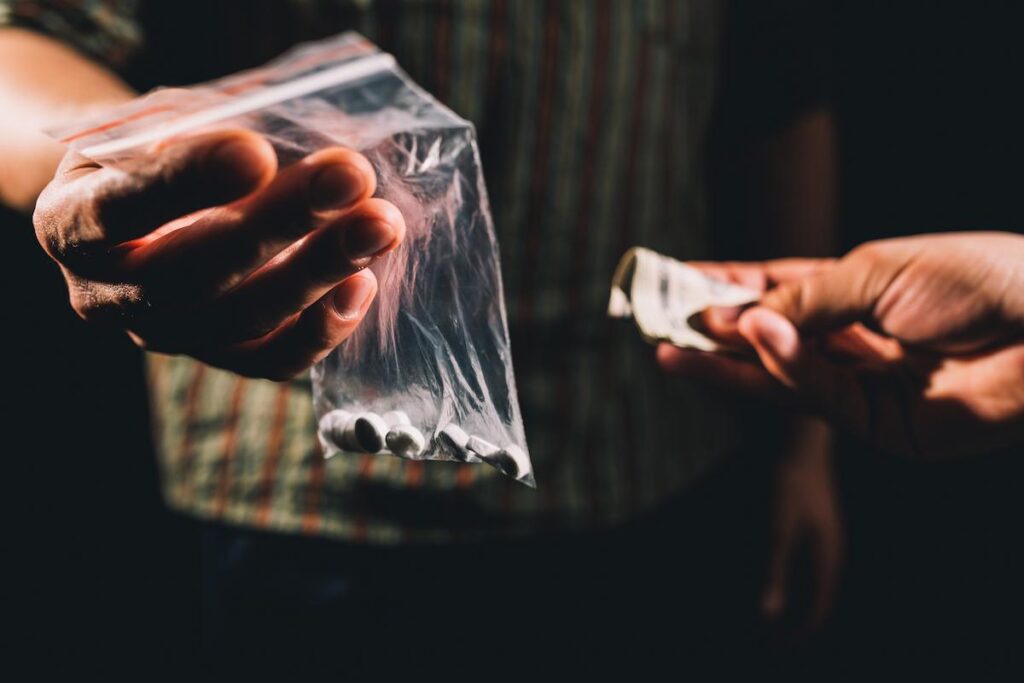In North Carolina, it is illegal to possess a controlled substance with the intent to…
One of the frequent criminal drug charges we often see are cases involving the intent to sell. North Carolina has serious consequences for criminal actions against drug laws. The charges for the intention to sell drugs carry much more consequences than mere possession.
In order to determine the intent to sell, North Carolina law requires prosecutors to prove that the convicted person had the intention of selling the drugs in their possession. There are several factors that can be used to build this case.
At The Law Offices of J. M. Kotzker, P.C., we’ve represented clients accused of all types of drug offenses, including possession, intent to sell, trafficking, manufacturing, and distribution. We’re sharing which factors indicate intent to sell and their subsequent consequences.

When Can You Be Charged With Intent To Sell?
With regard to drugs, selling means exchanging something of value for the drugs. This can be money or some other substance of value. In North Carolina, you can face intent to sell charges when you have:
- Unlawful possession of a controlled substance
- The knowledge of a controlled substance being in your possession
- The intention to sell the controlled substance
What Are Controlled Substances?
A controlled substance is a drug or chemical which is regulated by the government. These substances are typically illegal to possess or sell without a license.
The classification of a drug as a controlled substance is usually based on its potential for abuse and addiction. Schedule I drugs, for example, are considered to have a high potential for abuse and no currently accepted medical use.
What Factors Indicate Intent To Sell A Controlled Substance?
Generally, there are factors outside of the possession of illegal drugs that indicate possession with intent to sell or distribute. These factors are called circumstantial evidence and can be used by prosecutors to prove your guilt in a court of law.
Factors that may be considered circumstantial evidence include:
- The possession of large quantities of controlled substances
- The possession of packaging of controlled substances
- Large sums of cash
- Scales
- Baggies or other small plastic containers
- Ledgers or notebooks detailing drug transactions
- Multiple cell phones
- Pagers or beepers
- Weapons such as guns
- Prescription drugs not prescribed
- Chemicals used to manufacture drugs
Once the protection determines that there are drugs involved, the prosecution does not need to prove that you sold drugs but only prove your intention to do so.
What’s The Difference Between Possession and Intent to Sell?
In the case of a drug offense, there is a big difference between possession of a controlled substance and the intent to sell.
Simple possession is considered a misdemeanor, while the intent to sell is a felony in North Carolina as well as most other states.
Generally, a person is charged with Possession of a Controlled Substance With the Intent to Manufacture, Sell, or Deliver (PWISMD) if the law enforcement officers believe that the person had drugs in their possession with the intent to sell. However, there are many different factors that can contribute to this determination.
What Are The Consequences of Intent to Sell?
The penalty for possession of controlled substances with intent to sell depends on the category of the drug. For controlled substances classified in Schedule I or II, the penalty is a Class H felony, punishable by 4 to 25 months in prison.
For controlled substances classified in Schedule III, IV, V, or VI, the punishment is a Class I felony, punishable by 3 to 12 months in prison
What Is The Defense For Intent To Sell?
A skilled criminal defense attorney can give you the legal representation you need to prove your innocence if you are charged with intent to sell. Some of the factors that can be used to build a defense against the intent to sell are:
- Constitutional violations such as illegal search or search warrant violations
- Failure to prove a chain of custody
- Unlawful custody
- The accused was not in actual possession of the drugs
- The accused purchased large quantities of a controlled substance for personal use
Contact The Law Offices of J.M. Kotzker If You've Been Charged With Intent To Sell
At The Law Offices of J. M. Kotzker, P.C., we take the attorney-client relationship seriously. We’ve represented clients accused of all types of drug crimes, including drug possession, trafficking, manufacturing, and distribution. Avoid the long-term consequences of a drug conviction by contacting us today for a free consultation to discuss your case.
We know how to investigate these cases and build a strong defense so that you can get the best possible outcome. Contact us today to get a free consultation. Call us at (919) 439-5104 or fill out the form below.
